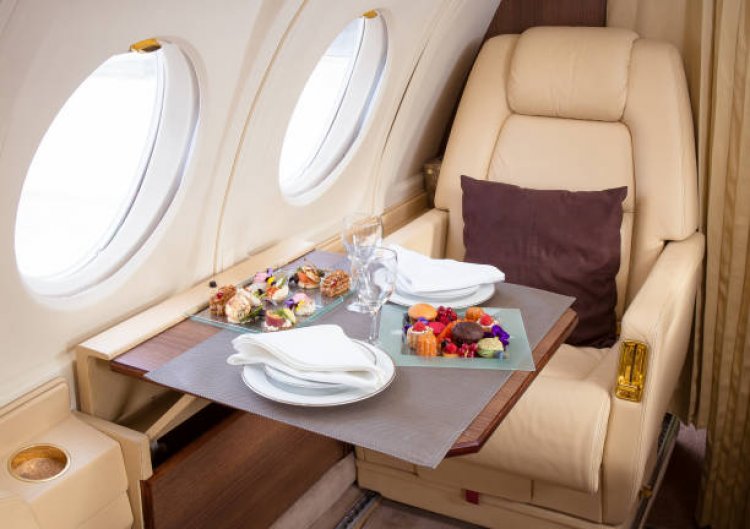Traveling First Class for Free
If you love traveling, live in or near a city with a large national or international airport, and you have the kind of lifestyle that lets you pick up and go on a moment's notice, then you might want to think about starting your own business as an "air courier".

Have you always dreamed of owning your own business, having the time and money to visit exotic locations and being able to fly first class?
If you love traveling, live in or near a city with a large national or international airport, and you have the kind of lifestyle that lets you pick up and go on a moment's notice, then you might want to think about starting your own business as an "air courier".
What is an air courier? It's a person who is hired to transport a specific item from one destination to another, within a specified deadline.
And, before you start imagining sinister men in trench coats carrying guns with silencers, and beautiful foreign women transporting secret microchips, let me reassure you that traveling as an air courier is 100% legal and aboveboard!
What you are asked to transport varies tremendously -- it can be almost anything -- legal documents such as letters or business contracts, children going from one country to another, medicine that was forgotten during a vacation, reports, computer disks, product prototypes -- the list is endless.
In fact, because of the "instant gratification" mindset today where we are used to information and communication that travels faster than the speed of light, air courier companies have seen their businesses grow tremendously over the last ten years. What that means for you is increased opportunities for free travel.
Who can become an air travel courier? Anyone who is over 18, holds a valid passport and who is in good health. It also helps if you're flexible and can pick up and travel on very short notice.
Why is this a wonderful opportunity?
When sending a package by air, the shipper has two options -- the first is to send the package as "cargo." Cargo travels alone (especially since the tragedy of 9/11), is shipped in bulk in large containers that usually aren't sent until the container is full, in order to maximize revenues for the airlines.
In addition, especially when cargo is sent overseas, there are sometimes long delays getting the package through customs, there are endless regulations that must be followed, inspections that must be passed, etc.
For the air courier companies, who have to make sure the package is not only delivered, but reaches the intended recipient as quickly as possible, these delays are unthinkable. (If they don't make their deadlines, then their competitors will. Think of the slogan from one such company..."when it absolutely, positively has to be there overnight...")
On the other hand, if the same item is considered "personal baggage" and is carried with a ticketed passenger, it arrives with the passenger, and generally passes through customs quickly, without all the delays.
Plus, a person can book a ticket for a specific flight arriving at their destination at a specific time -- not so for cargo. Which means that a shipment that could take days or weeks if it's classified as cargo, can take hours instead because it's classified as baggage.
Because very few of the air courier companies have the resources to employ full-time couriers, the industry itself has come to rely on freelance air couriers, which, even when having to pay someone to travel, and covering the cost of their airfare, is still a better ROI when compared against the paying full-time wages, holiday and sick pay, insurance and all of the other costs involved with having employees.
This is where you come in.
As an air courier, you are providing a valuable service in a growing market. And from the traveler's point of view, you might find yourself flying to Paris one day, and Hong Kong a week later!
Once you've been hired, the process is pretty simple: the company contacts you, to check your availability. When you confirm, they book the flight and let you know when to be at the airport. You're met at the airport by a representative, who gives you your ticket, a list of item or items you're transporting, and your baggage claim tickets. They'll usually even have checked you in, saving you many hassles. You get to sit in first class, and enjoy the flight. That's it. You don't have to contact the recipient in the city you're flying to, actually pick up the package on your way to the airport, or do anything other than be responsible for it going from one airport to another.
At your destination, you'll be met by another company representative, who will take the baggage claim tickets, and give you your return ticket.
How long do you get to stay? That depends on you and the air courier company. Sometimes your schedule will be tight -- you may only get hours between flights. Other times, you'll have a day or two. Obviously, as your reputation increases and the companies you work for know that they can rely on you, you have more room for negotiating.
There are several ways to get started. There are actually companies who recruit air couriers, and the fees for joining are usually nominal. The benefits of going through a certified company can be many. For example, they often provide information that it could take you a long time to figure out on your own. They also offer forums, newsletters and other resources to help you succeed. Because they have built a reputation, you might find it easier to get started in the business by working for one of them at first.
But, you can also find the information completely on your own, and start off freelancing. Look in the yellow pages for air couriers that are located near your local airport. Figure out where you'd like to travel to, and make a list of the locations they serve. Because there are companies who transport items both internationally or just within the states, where you travel is largely going to be a matter of personal choice.
Also, make sure that you investigate each company before applying with them. You want to make sure that they are a solid business, with a good reputation. Once you've narrowed down your choices, get on the phone, and find out what their application process is. Many companies today prefer that you apply online. Whatever the process is, make sure that you provide them with all the information they request.
Timely tip: After submitting your application, follow up with a thank-you letter, on your new "company" letterhead. Remind them of your availability, that you can accept short or no notice flights. Find a way to position yourself above that of the other couriers.
Once you've gone through the process the first time, you'll have a much better idea about which other companies you want to apply to and how to hone your interview skills. (So don't make your first application with the biggest company that you want to work for the most.) Obviously, if you limit yourself to one or two companies, you'll also be limiting the amount of work you'll get and the locations you can travel to.
Timely Tip: Put together a database of the companies you've applied to, the date you applied, and contact information. Follow up with the company regularly, but don't be a pest.
Once you've been hired, don't be surprised if you start getting calls within the first couple of weeks. There is a growing need for professional, responsible air couriers.
Here are some things to keep in mind when you start working:
- Be professional. Remember that while shorts and flip flops may be comfortable for vacationers, you're working and representing the air courier company.
- Often the only baggage you get to take with you is hand carried. Invest in microfiber clothing in basic colors, and learn to pack essentials only. If you do get to stay for longer than a few days, you can always pick up some essentials once you're there.
- Give your own business card to the company representative in the country you travel to, and make sure that your email and voice mail information is included.
- Apply to all the companies you've decided you want to work for, and then follow up with the ones that haven't contacted you regularly -- perhaps a polite letter or even a one-page newsletter that lists the latest on industry related news.
- Stay organized. Don't over commit yourself, and try never to have to cancel a trip.
What's Your Reaction?



































































































